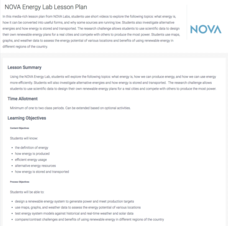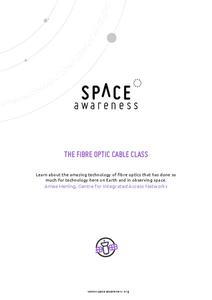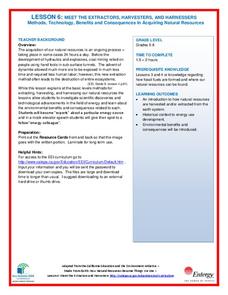Kenan Fellows
Sustainability: Learning for a Lifetime – The Importance of Water
Water is essential for life—and understanding the importance of clean drinking water is essential in understanding sustainability! Show your environmental science class the basics of water testing and treatment through a week-long...
Teach Engineering
Designing a Sustainable Guest Village in the Saguaro National Park
Brainstorm ideas to design a sustainable guest village in the Sonoran Desert. The first installment of a nine-part unit teaches young environmental scientists about the basics of the Saguaro National Park and about sustainable design....
Science 4 Inquiry
Carbon and Climate
The carbon cycle is natural and has happened for millions of years, so can humans change it? Young scientists play the role of carbon as they travel through the carbon cycle. They complete two rounds, once before the industrial...
Science 4 Inquiry
Rocks Makin' Rocks: Rock Cycle Simulation
Scholars review prior knowledge before completing a hands-on simulation of the rock cycle. They write stories or songs summarizing their simulations to demonstrate mastery.
PBS
NOVA Energy Lab Lesson Plan
Can our energy resources keep up with our ever-growing population? Science scholars learn the basics of energy and Earth's energy resources during an electrifying lesson. The resource combines video clips and an engineering design...
Space Awareness
Oceans as a Heat Reservoir
Oceans absorb half of the carbon dioxide and 80 percent of the greenhouse gases released into the atmosphere. Scholars learn how and why the oceans store heat more effectively than land and how they help mitigate global warming. Pupils...
Space Awareness
The Fibre Optic Cable Class
Many people know that fiber optics are used in delivering the Internet, but are surprised to learn they are also used in astronomy. Scholars explore light, reflection, and fiber optics through hands-on activities. They discuss methods of...
Illinois Department of Natural Resources
Section One: What is Biodiversity?
Four intriguing and scientific activities invite learners to explore the natural resources of their town. The activities cover concepts such as genetic traits, organizing species in a taxonomy, the differences between different species...
LABScI
Kinematics: The Gravity Lab
Falling objects can be brutal if you don't protect your noodle! Scholars explore the motion of falling objects through measuring short intervals to determine if the distance traveled varies with time. Building off of this, scholars...
LABScI
Acoustics: The Sound Lab
If the delay between a sound and its echo is less than 1/10th of a second, the human ear can’t distinguish it. Through the use of a Slinky, rubber band guitar, and straws, scholars explore where sound comes from and how it travels. Whole...
LABScI
Potential and Kinetic Energy: The Roller Coaster Lab
Ron Toomer, a famous roller coaster designer, suffered from motion sickness. Pupils design their own roller coasters, learning about potential and kinetic energy in the process. Labs focus on the importance of drop height, energy...
Virginia Department of Education
The Cycles of Nature
Encourage peer collaboration and assist with the creation of visual aids to identify carbon, water, and nitrogen cycles as your class learns more about nature. They discuss relative information, create a visual aid depicting the chosen...
Curated OER
Food for Spaceflight
When astronauts get hungry in outer space, they can't just call and have a pizza delivered. In order to gain an appreciation for the challenges associated with space travel, young learners are given the task of selecting, testing, and...
Space Awareness
The Intertropical Convergence Zone
Young scientists know it is hotter along the equator, but why is it also rainier? Through the process of completing two experiments and a worksheet, scholars discover the answer is the intertropical convergence zone. First, they...
NASA
Stellar Fingerprints and Doppler Red Shifts
Young scientists observe the spectra of elements and compare that to the Doppler effect. Hook scholars from the beginning all the way to the extension activities in this 5E-format lesson plan.
Curated OER
Fossil Kit I - Lesson Plan
Here is a 14-page lesson plan that deftly outlines a wonderful educational experience for your youngsters. In it, students learn about a variety of animals that have left behind clues of their existence in fossil form. Many excellent...
Curated OER
Neither Wind Nor Rain
Here is another in the interesting series of lessons that use the special State Quarters as a learning tool. This one uses the North Dakota State Quarter. During this lesson, your class learns about the different patterns of erosion, and...
Space Awareness
The Big Meltdown
Explore the world (our world) of melting ice caps. Why are these caps melting? What is the effect of melting ice caps? Dive into the ever-present issue of global warming with a resource that has learners looking at data and participating...
PHET
Features of the Sun
There are so many things to discover about the sun! Pupils discuss their knowledge of the sun, explore its features, apply their knowledge by labeling photographs, and then reflect on their learning by working in groups to draw and label...
Space Awareness
Coma Cluster of Galaxies
Scientists classify everything from the smallest cells to the largest galaxies, but how do they decide on a classification system? Scholars use 40 pictures of galaxies taken by the Hubble Space Telescope to sort and try creating their...
National Wildlife Federation
Meet the Extractors, Harvesters, and Harnessers: Methods, Technology, Benefits and Consequences in Acquiring Natural Resources
There are advantages and disadvantages to all sources of energy; the trick is determining which one has the least impact! Part six in the series of 12 has learners further explore energy resources. After reading information about one of...
NOAA
A Day in the Life of an Ocean Explorer
What's life like aboard an ocean exploration vessel? Junior oceanographers examine the important role of communication in ocean research in lesson two of a five-part series from NOAA. The materials introduce the class to life on board...
Space Awareness
Model of a Black Hole
Even light cannot leave the force of a black hole! Learners use a model to explore the gravitational force of a black hole. An elastic bandage and heavy ball serve to create the hole, while marbles become the victims of its strong force.
Wilderness Classroom
Pollution
Educate scholars on pollution—air, water, and land—with a series of lessons that begin with a thorough explanation of each type. Learners then take part in three activities to reinforce the importance of reducing pollution. They...

























